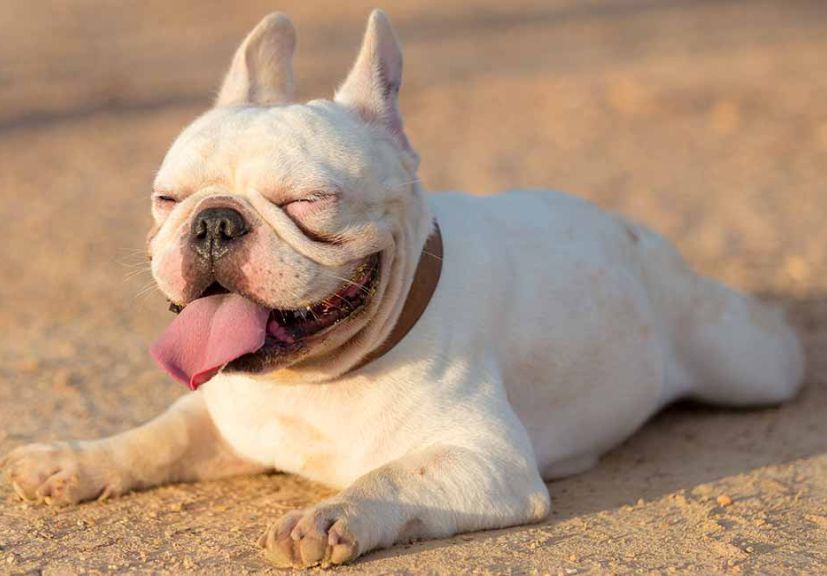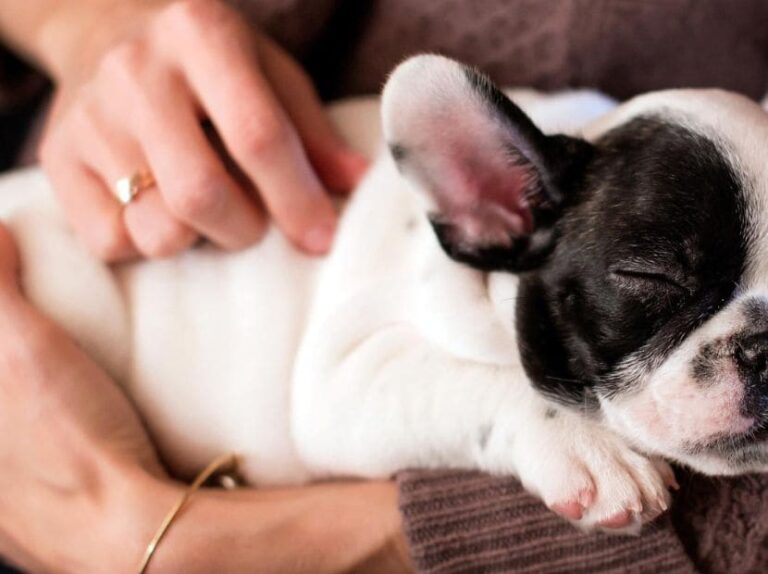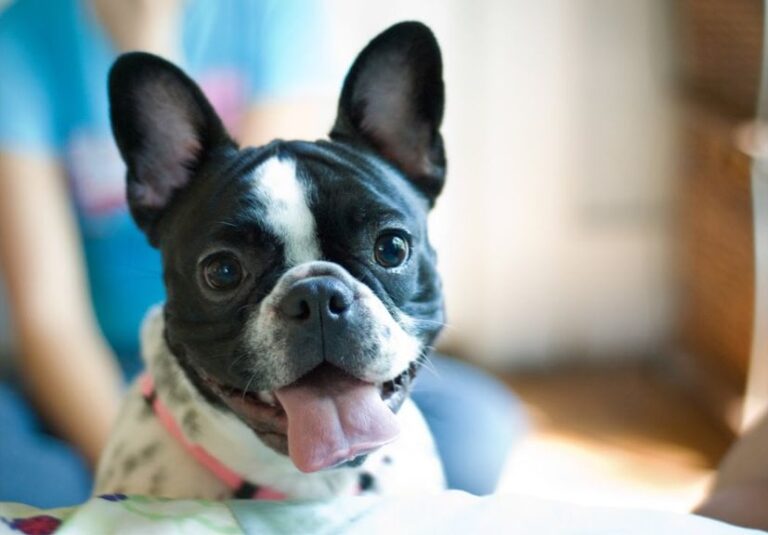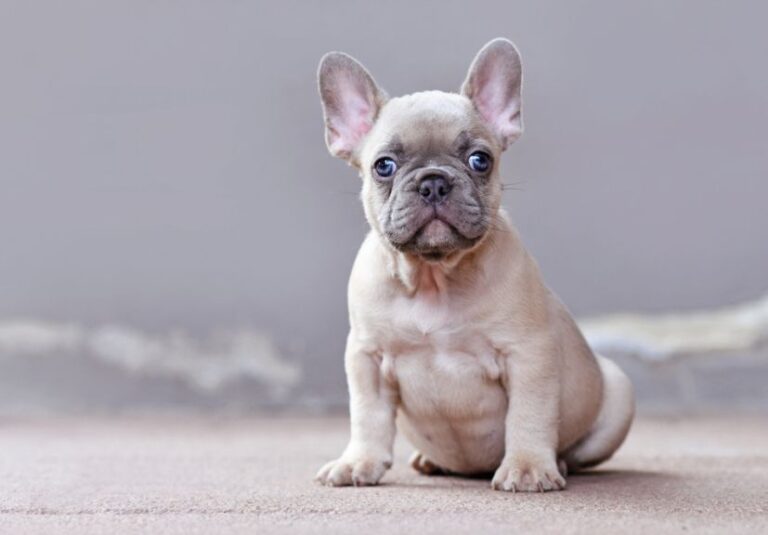So, What’s Albinism in French Bulldogs Anyway?

Let’s break it down—what exactly does it mean to say a French Bulldog is albino? In a nutshell, albinism is a genetic condition that means a dog’s skin, hair, and eyes don’t have pigment. Unlike regular white French Bulldogs, albino Frenchies have no melanin, which gives them that super pale look.
You can usually spot a person with albinism Frenchie by its light or pinkish skin, almost white fur, and light-colored eyes—usually blue or pale pink. Their eyes can also be light-sensitive, which can cause some vision problems. Albinism isn’t just about looks; it’s a genetic trait with some extra health considerations.
How Rare Are Albino French Bulldogs?
Consider adding an albino French Bulldog to your crew. They’re pretty rare. Breeding for albinism isn’t usually encouraged because of the health risks associated with it. Albino French Bulldogs aren’t as common as their pigmented buddies, and finding a healthy one from a good breeder might take some searching.
Health Considerations for Albino French Bulldogs
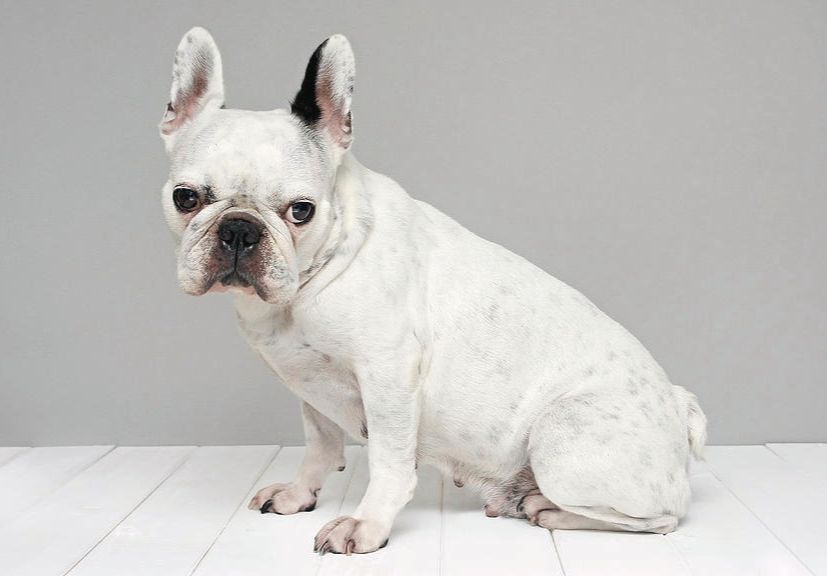
Let’s get into the details of what it’s like to care for an albino French Bulldog. These dogs are adorable but come with some extra care requirements. Here’s what you need to know:
Skin Sensitivity: The Sun Isn’t Their BFF
French bulldogs are prone to different health problems, but Albino Frenchies are more prone to them. One of the biggest issues with albino French Bulldogs is their skin sensitivity. Without melanin, they don’t have any natural protection against the sun’s UV rays, making them super prone to sunburn and even skin cancer.
- Sun Protection: You’ll want dog-friendly sunscreen for your albino Frenchie. Make sure it’s specifically for dogs—human sunscreen can be bad news. You might also want to consider getting them some protective clothing, like a UV-blocking shirt or a cute little hat for those sunny days.
Vision Problems: Seeing the World a Little Differently
Albino dogs often have vision issues because of the lack of pigment in their eyes. This can make them sensitive to bright light, leading to discomfort or even blindness in extreme cases.
- Eye Care: To help with their vision, keep your albino Frenchie in well-lit, but not too bright, environments. Consider getting dog goggles to protect their eyes when you’re out and about.
Hearing Issues: Say What?
Here’s a fun fact—dog albinism is often linked to congenital deafness. It’s not a given, but it’s something to watch.
- Communication Tips: If your albino Frenchie has hearing issues, training might require some creativity. Use hand signals, facial expressions, or vibrating collars to communicate. Remember, patience is the name of the game!
Immune System Challenges: Extra TLC Needed
Albino French Bulldogs might have weaker immune systems, making them more prone to infections and illnesses. This means you’ll need to be extra careful with their health.
- Preventive Care: Regular vet visits are a must. Stay on top of vaccinations, and don’t skip those routine check-ups. A healthy diet of vitamins and minerals can also help keep their immune system strong.
Dietary Needs: You Are What You Eat
What you feed your albino French Bulldog is super important. These special Frenchies shares the same feeding guide as other types of Frenchies but need a bit more care. A balanced diet can help support their skin health, vision, and immune system.
- Nutritional Supplements: Consider adding supplements like omega-3 fatty acids, which are great for skin and coat health, and vitamins A and E for immune support. Always check with your vet before starting any new supplements.
Facts About Albino French Bulldogs
- Rarity: Albino French Bulldogs are rare compared to other French Bulldog color variations.
- Pink Skin: Their skin is pink due to a lack of melanin, which makes them sensitive to sunburn and UV radiation.
- Blue Eyes: Albino French Bulldogs typically have blue eyes, although other eye colors are possible.
- Sensitive Skin: Their pink skin is more susceptible to sunburn and irritation, so protecting them from excessive sun exposure is crucial.
- Unique Appearance: Their all-white coat and pink skin create a striking and unique appearance.
- Potential Health Challenges: Albinism can be associated with certain health conditions, such as deafness, vision problems, and increased risk of skin cancer.
- Special Care Requirements: Albino French Bulldogs may require additional care, including regular veterinary check-ups, sun protection, and potential dietary adjustments.
Caring for Your Albino French Bulldog
Owning an albino French bulldog is a commitment, but it is worth it and requires more care than the common French bulldog. Let’s go over some tips to keep your pup happy and healthy.
Albino French Bulldog Puppies

Caring for an albino French Bulldog puppy is similar to caring for an adult, but with some extra considerations since puppies are more vulnerable. Start early with good skincare habits. Apply sunscreen when they go outside and ensure plenty of shade. Their skin is delicate, so they use hypoallergenic shampoos and moisturizers. Puppies are energetic, so it’s the perfect time to introduce them to new experiences. Socialize them with other dogs and people, but be mindful of their sensory limitations. Positive reinforcement is key, especially if they have hearing or vision issues.
Daily Care Routine
Regularly check your albino Frenchie’s skin for any signs of irritation, sores, or sunburn. Bathe them with hypoallergenic shampoo to avoid allergic reactions. Just because they need extra care doesn’t mean they don’t need exercise! However, it’s best to keep outdoor activities to the early morning or late evening when the sun is less strong. Keep your pup entertained indoors with toys, games, and training exercises. Puzzle toys are great for mental stimulation; playing fetch in the hallway can burn off some energy.
Products to Use for Albino French Bulldogs’ Health
Choosing the right products can make a huge difference in the health and happiness of your albino French Bulldog. Here are some must-haves:
- Dog-Friendly Sunscreen: Opt for a sunscreen made specifically for dogs. Products like Epi-Pet Sun Protector are safe and effective.
- Protective Clothing: UV-blocking shirts and hats can offer additional protection. Brands like PlayaPup make sun-protective clothing for dogs.
- Hypoallergenic Shampoo: Use gentle shampoos like Earthbath Oatmeal & Aloe on sensitive skin.
- Moisturizers: Use a dog-safe moisturizer after a bath to keep your skin hydrated and reduce irritation.
- Dog Goggles: Consider getting a pair of dog goggles, like Rex Specs, to protect your Frenchie’s eyes from the sun.
- Eye Drops: If your dog suffers from dry eyes, lubricating eye drops can provide relief.
- Omega-3 Fatty Acids: These supplements can improve skin and coat health. Fish oil supplements are a popular choice.
- Multivitamins: A good multivitamin can support overall health. Look for one tailored to your dog’s needs, like Zesty Paws Multivitamin Bites.
- Vibrating Collars: If your albino Frenchie is deaf, a vibrating collar can be an effective training tool.
Common Challenges and How to Overcome Them
Albinism can present unique challenges for French Bulldogs. Understanding their needs and providing appropriate care is essential. Here are some tips to help you navigate the journey.
Managing Sun Exposure
Albino French Bulldogs love the outdoors like any other dog, but you must be extra careful. Stick to shaded areas and limit sun exposure. When outside, make sure they’re wearing their sunscreen and protective gear.
Dealing with Health Issues
Be proactive about your albino Frenchie’s health. Regular vet visits and a close eye on their behavior or appearance changes will go a long way. Early detection of problems can make a huge difference.
Finding the Right Veterinarian
Not all vets are familiar with the special needs of albino dogs. Look for a vet with experience with albinism in pets or willing to learn about the condition to provide the best care.
Addressing Behavioral Concerns
If your albino French Bulldog is struggling with anxiety due to their sensory limitations, consider using calming techniques like aromatherapy, calming supplements, or even anxiety wraps. Training should always be positive and patient, focusing on building trust.
Get Insurance of French Bulldogs With Albinism
Albino French Bulldogs often require more specialized care due to their increased risk of genetic health conditions like deafness and vision problems. This can lead to higher veterinary bills, which can influence the cost of pet insurance. While not all albino French Bulldogs will develop these issues, the potential for increased healthcare expenses makes Frenchie insurance premiums more likely to be higher than non-albino French Bulldogs. It’s essential to carefully research and compare different pet insurance policies to find one that adequately covers the specific needs of your albino French Bulldog while fitting within your budget.
Conclusion
Albino French Bulldogs are truly one-of-a-kind pets. Their unique appearance and gentle nature make them stand out, but they require extra care and attention. By understanding their needs—protecting their sensitive skin from the sun or addressing potential hearing and vision issues—you can ensure that your albino Frenchie lives a long, happy, and healthy life.
Owning an albino French Bulldog isn’t just about having a rare dog; it’s about committing to their well-being and giving them the best life possible. With the right care, these dogs can be as vibrant and full of life as any other French Bulldog, making them a wonderful addition to any family.
Frequently Asked Questions (FAQs) About Albino French Bulldogs
What is the life expectancy of an albino French Bulldog?
Albino French Bulldogs typically have a life expectancy similar to standard French Bulldogs, around 10 to 12 years old. However, because they may be more prone to certain health issues, regular veterinary care and proper management of their unique needs can help them live a full and healthy life.
How can I tell if my French Bulldog is albino or has a white coat?
To determine if your French Bulldog is albino, you’ll want to look for key characteristics such as extremely pale or pinkish skin, very light-coloured eyes (often blue or pink), and a complete lack of pigmentation in the fur. Albino French Bulldogs also tend to have more sensitive skin and are more prone to vision and hearing problems than white-coated French Bulldogs.
Are albino French Bulldogs more prone to certain diseases?
Albino French Bulldogs are more susceptible to certain health issues due to their lack of melanin. They are at higher risk for sunburn, skin cancer, vision problems, and congenital deafness. They may also have a weaker immune system, making them more prone to infections and other health problems. Regular vet check-ups and proactive care are essential for managing these risks.
Can albino French Bulldogs live a normal life with proper care?
Absolutely! With the right care, albino French Bulldogs can lead happy and fulfilling lives. This includes protecting them from the sun, monitoring their skin and eyes, and providing a balanced diet with the necessary supplements. It’s important to stay vigilant about their health and work closely with a vet who understands their unique needs.
What should I look for in a breeder to avoid unethical practices?
When looking for a breeder, it’s crucial to choose one who prioritizes the health and well-being of their dogs over producing rare colors like albinism. A reputable breeder will perform health screenings on their breeding dogs, avoid breeding dogs solely for color, and be transparent about their puppies’ health and genetic history. Avoid breeders who seem focused on producing “rare” or “exotic” dogs at the expense of health.

